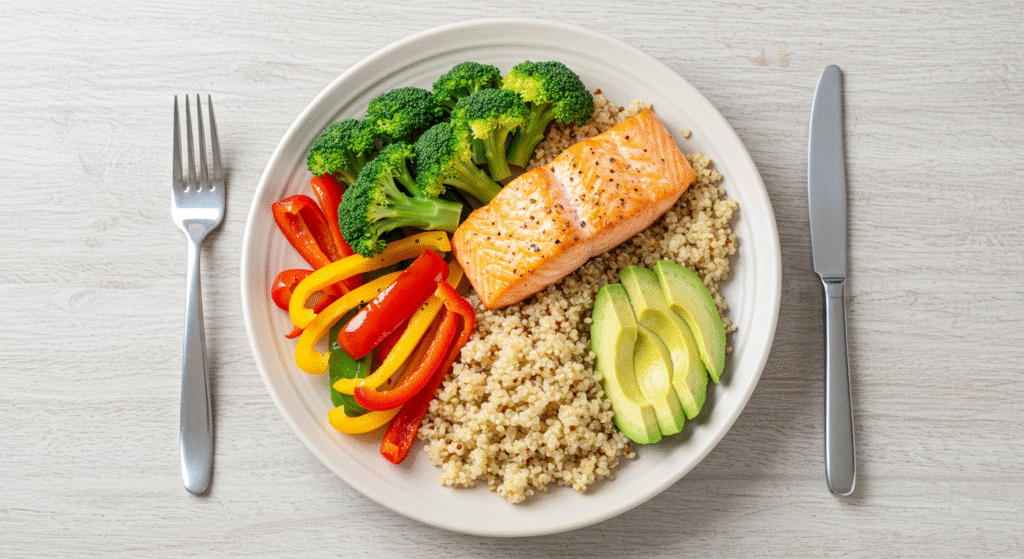Introduction: Why Most Weight Loss Advice Doesn’t Stick (and What Actually Works)
If you’ve ever searched “how to lose weight fast,” you’ve probably found yourself lost in a jungle of fad diets, extreme cleanses, or fitness trends that promise a new body in 30 days. And let’s be real—most of those plans work about as well as duct-taping your fridge shut: maybe effective short-term, but not exactly sustainable long-term.
Healthy, lasting weight loss isn’t about cutting out every carb, living at the gym, or depriving yourself of joy. It’s about building realistic, science-backed habits that work with—not against—your lifestyle. The truth? You don’t need a “miracle diet.” You need practical strategies you can stick with for life.
In this guide, you’ll learn the most effective, sustainable weight loss tips that go beyond quick fixes. We’ll cover proven nutrition strategies, mindset tools, movement techniques, and smart lifestyle changes backed by real expertise. You’ll walk away with not just “what to do,” but how to make each tip stick for good.
What Are the Best Healthy Weight Loss Tips That Actually Last?
Losing weight (and keeping it off) has less to do with punishment diets and more to do with building better habits consistently. Below are the pillars of lasting success, broken down into practical steps.
How Important Is Mindset for Sustainable Weight Loss?
Before you pick up a dumbbell or put down the cookie, start here. Weight loss begins in your mind, not your mouth.
Why Quick-Fix Thinking Fails
- They promise speed, not sustainability.
- They often trigger yo-yo dieting: lose, regain, repeat.
- They focus on restriction rather than behavior change.
How to Build a Long-Term Weight Loss Mindset
- Set Process Goals, Not Just Scale Goals
- Example: Instead of “lose 10 pounds,” try: “walk 20 minutes 5 days a week.”
- Adopt a Growth Mindset
- Small slip-ups aren’t failures, they’re learning opportunities.
- Focus on ‘Addition,’ Not Just Subtraction
- Add more veggies, more water, more steps—instead of only focusing on cutting calories.
💡 Pro tip: Ask yourself daily, “What’s one small choice I can make today that my future self will thank me for?”
What Are the Most Effective Nutrition Habits for Lasting Weight Loss?
Nutrition is the foundation—no amount of treadmill miles can compete with a poor diet. But “diet” doesn’t have to mean “misery.”
How Should I Structure My Diet Without Feeling Deprived?
Think of your plate as a power tool. The formula:
- ½ Vegetables & Fruit – Fiber, antioxidants, volume with fewer calories.
- ¼ Lean Protein – Chicken, fish, legumes, tofu, eggs to support muscle.
- ¼ Smart Carbs – Whole grains, sweet potatoes, beans, fruit. Healthy carbs give steady energy.
- Healthy Fats Wisely – Avocado, olive oil, nuts (small but mighty calorie density).
What Role Does Portion Control Play?
Even “healthy” foods can lead to weight gain if eaten in unlimited quantities.
- Use a smaller plate trick (your brain sees more food than you think it does).
- Practice mindful eating: put down your fork between bites, eat slowly, and stop at ~80% full.
Should I Cut Out Entire Food Groups?
Nope. Cutting carbs or swearing off chocolate forever? That’s a recipe for binging later. Balance wins.
Example: Instead of “I’ll never eat pasta again,” try “I’ll pair one cup of pasta with roasted veggies and grilled chicken.”
How Does Exercise Help With Weight Loss That Sticks?
You don’t need to live at the gym. The goal? Movement you enjoy and can repeat regularly.
What Types of Exercise Are Best?
- Strength Training (2–3x per week) → Builds muscle, boosts metabolism long-term.
- Cardio/Conditioning (150 minutes moderate or 75 vigorous per week) → Burns calories, strengthens heart.
- Lifestyle Movement (NEAT) → Walking, taking stairs, gardening—adds up massively.
Example: A daily 20-min walk = 7000+ minutes a year = thousands of calories burned without “working out.”
How Do I Stay Motivated to Exercise?
- Pick something fun (dance, hiking, pickleball—yes, pickleball counts).
- Commit to a minimum baseline habit: “I’ll move for 10 minutes daily,” which often snowballs into more.
What Lifestyle Changes Make the Biggest Difference for Weight Loss?
Nutrition and exercise are essential, but lifestyle factors often decide whether you succeed long-term.
How Much Does Sleep Affect Weight Loss?
- Poor sleep = more cravings, higher hunger hormones, weaker willpower.
- Target: 7–9 hours per night.
- Wind-down routine: Limit screens, dim lights, and keep your bedroom cool.
Does Stress Management Impact Weight?
Chronic stress = emotional eating, higher cortisol, fat storage.
- Stress busters: deep breathing, journaling, yoga, or simply walking outside.
What Role Does Hydration Play?
- Sometimes “hunger” is dehydration in disguise.
- Aim for 2–3 liters per day, depending on activity.
- Easy hack: Drink a glass before each meal.
How Can I Track Progress Without Becoming Obsessed With the Scale?
The scale is one tool, not the only one.
Use Multiple Metrics:
- Body measurements (waist, hips, arms).
- Progress photos (taken monthly).
- Fitness markers (faster mile time, more push-ups).
- Energy levels, mood, sleep quality.
What Are Some Science-Backed Daily Habits That Support Weight Loss?
- Meal Prep – Plan ahead to prevent “hangry” takeout ordering.
- Protein with Every Meal – Supports fullness and muscle preservation.
- Front-Load Veggies – Half your plate = fewer calories, more nutrients.
- Set a Step Goal – 7,000–10,000 steps is strongly linked to weight control.
- Limit Liquid Calories – Swap soda, lattes, and juices with water or unsweetened tea.
- Consistent Eating Window – Helps regulate hunger cues.
FAQs on Healthy Weight Loss
Q1: How much weight can I lose safely in a week?
Most experts recommend 1–2 pounds per week for sustainable loss.
Q2: Is intermittent fasting a good strategy?
It works for many, but it’s not magic—success depends on reduced calorie intake and healthy food choices.
Q3: Do I need supplements to lose weight?
Usually no. Focus on whole foods first; only address deficiencies (like vitamin D, iron, or B12) as confirmed by a healthcare professional.
Q4: Can I lose weight without exercising?
Yes, weight loss is mostly diet-driven, but exercise significantly boosts long-term maintenance and health.
Q5: What’s the biggest mistake people make?
Going too extreme, too fast. Build small, sustainable habits instead.
Conclusion: Build Habits That Love You Back
Lasting weight loss is not about extremes—it’s about consistency. By focusing on mindset shifts, balanced nutrition, smart movement, and supportive lifestyle choices, you can create a healthier routine that doesn’t just shed pounds but also fuels energy, confidence, and joy.
Start with one foundational change this week—maybe it’s a daily walk, maybe swapping soda for water, maybe finally prioritizing sleep. Each small win compounds over time. In six months, you’ll thank yourself for not following another fad diet and instead choosing healthy weight loss tips that last.
👉 Share this post with someone who’s tired of quick fixes and ready for the real thing—or try just one tip from today and notice how it makes you feel tomorrow.

